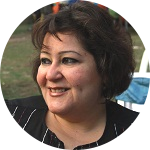Mohamed Saad is a photographer with the Egyptian news site al- Badeel, and he was covering the clashes in downtown Cairo, on Saturday 9 March, when he was stopped by the police.
They arrested, detained and brutally beat him.
They destroyed his camera and his equipment, and stole his wallet. Only after five hours of detention, they released him.
Attacks like these have become more and more common in Egypt.
Intimidations and detentions are now part of the daily life of Egyptian journalists and photographers.
“No one will touch media freedoms. There will be no pens broken, no opinions prevented, no channels or newspapers shut down in my era,” vowed the new Egyptian president, Mohamed Morsi, during his electoral campaign.
Speaking to Equal Times, Abeer Saady, the Vice Chair of the Egyptian Press Syndicate, expressed her concerns about the crackdown on freedom of expression.
She argues that journalists are targeted while reporting protests and clashes.
“Our colleague, al-Housseiny Abu Daif, was shot dead while reporting on the protests around the presidential palace last December. The number of journalists wounded while reporting on the frequent protests has increased enormously, also the number of arrests is going up,” she says.
The International Federation of Journalists (IFJ) condemned the shooting of al-Housseiny and urged the authorities to investigate thoroughly the circumstances of the incident.
“The authorities have an obligation to protect our colleagues and do everything in their power to prevent and punish acts of violence targeting media," said IFJ General Secretary, Beth Costa.
There have been four times as many lawsuits for "insulting the President" in Morsi’s first 200 days in office than during the entire 30 years that Mubarak ruled, according to human rights lawyer Gamal Eid, interviewed by the largest English-language news website, state-owned al-Ahram.
Not only did the number of lawsuits increase, but they are now filed by the presidency directly.
Under Mubarak the presidency had never officially filed a legal complaint against a journalist.
Lawyers with ties to Mubarak’s legal team filed the suits, such as in the case against journalist Ibrahim Eissa, who was accused of spreading rumors about Mubarak’s health.
This trend shows to what extent the Morsi regime does not accept any criticism.
Last January, the editor of al-Ahram Online, Hani Shukrallah, was forced out of his job by al-Ahram’s new chairman, Mamdouh el-Wali, who is considered a member of the Muslim Brotherhood.
Shukrallah is one of Egypt’s most respected professional journalists and is known for his criticism about the Muslim brotherhood.
Ironically, Shukrallah had already been removed during the dictatorship of Hosni Mubarak, as the editor in chief of “The Weekly”, another al-Ahram publication.
However, al-Ahram is not the only state-owned newspaper that is now headed by a supporter of the Muslim Brotherhood.
Other institutions are in the same situation, since the Shura Council – dominated by Islamists – appoints them.
“Mubarak’s regime did not collapse. Only the head of the regime and his entourage were overthrown, but its dynamics and rules are still the same,” said Saady.
The new regime did not change the old system, and did not meet the demands of the revolution; that is why it had to resort to the methods of the old regime, she argues: “They are reproducing what was happening during Mubarak’s days, but now is even more outrageous.”
Morsi is the first freely elected president in Egypt.
He came to power after a revolution, demanding “bread, freedom, and dignity”, but none of these demands were met.
“Journalists are determined to continue and fight for their right to freedom of expression. They are determined to do their work, to report about the reality in Egypt, regardless of the hazards,” stresses Saady.









